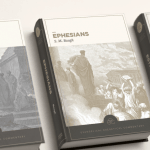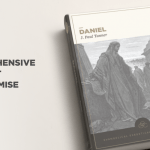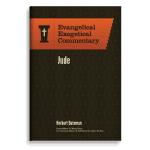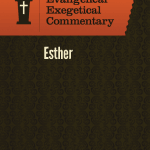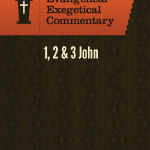
In the order of books in the Hebrew canon, 1?2 Samuel follows immediately the book of Judges, while in the order found in the LXX, the book of Ruth is inserted between them. But since the setting of the book of Ruth is also in the period of the judges, both arrangements make sense chronologically. The sequence in history was: (1) the exodus from Egypt and journey to the eastern edge of the promised land (Exodus?Deuteronomy), (2) the entrance into and conquest of the land (Joshua), (3) the period of earliest settlement (Judges/Ruth), and (4) the beginning of the monarchy (1?2 Samuel). The period of the judges is portrayed in both a negative (Judges) and positive light (Ruth). But in both books there is a sense of need for the next step: the institution of a God-honoring kingship, as God had predicted in Deuteronomy. In Judges it is expressed through the refrain ?In those days there was no king in Israel: everyone did what was right in his own eyes? (e.g., Judg 17:6; 21:25). In Ruth it is expressed in the short genealogy of David found in the final chapter (Ruth 4:18?22).?Both books?each in its own way?look forward to God?s chosen king to rule them. The identity of that king?left unidentified in Judges?was made specific in Ruth: David, a direct descendant of Ruth and Boaz.
The historical context that follows 1?2 Samuel is as important as the one that precedes it. What began with David and was solemnized by Yahweh?s covenant with David (2 Sam 7) had a future. In the near view, this future was a gradual decline (1?2 Kings) leading to Jerusalem?s fall to the Babylonians in 586 bc, which seemingly cast into doubt Yahweh?s promise of an enduring line of Davidic kings on the throne in Jerusalem (2 Sam 7:13?16). The tension is evident: Was God?s promise not what it claimed to be?irrevocable?and David?s dynasty no different from Saul?s, who had failed before him? Or was there still a future, one that was not yet seen but nevertheless certain? The answer was partially given by the writings of the prophets (Amos, Hosea, Isaiah, Jeremiah, Daniel), who predicted a restoration of the Davidic throne in the remote future. But their prophecies?encouraging though they were?left this future Davidic king unidentified. The final answer would come in another testament: in the announcement of the birth, life, and death of Yeshua/Jesus, the Messiah, the Son of God, who would sit on the throne of David forever (Luke 1:32?33; Mark 11:10; Acts 15:16?18; Rom 1:3?5; 2 Tim 2:8; Rev 3:7; 5:5; 22:16).
The story of David is so important for Christians because of how it fits into God?s epoch-spanning plan, which led ultimately to the eternal reign of Jesus, the son of David. The story of David will not depict a sinless or perfect king, but one who in so many ways prefigured the sinless and perfect individual who would fulfill all the promise that was present already in David. This is what can be called the messianic message of 1?2 Samuel: a message that is rooted in a real, historical person and a sequence of real historical events.
Basing himself on Edwin Thiele?s chronological system, Youngblood estimates that the events recorded in 1?2 Samuel span a period from 1080 bc (the birth of Samuel) to 970 bc (the death of David). The opening chapters of 1 Samuel are set in the same period of Israel?s history as the book of Judges. The final chapters of 2 Samuel are set in the reign of King David. The books of Samuel therefore record a period of transition between the temporary leadership (?rule?) by ?judges? (?????????) and the permanent (dynastic) rule of kings (????????). The seam marking this transition is found in 1 Sam 8?10, where Israel?s representatives asked for a human king to lead them instead of the judge Samuel. Although their request contained the clause ?a king ? like all the nations? (1 Sam 8:2), which could mean that they wanted kings in the mold of the surrounding pagan nations, there was nothing overtly challenging the notion that such kings would merely rule under Yahweh, as the judges (including Samuel) had been doing. It was a question of how Yahweh?s rule over them would be mediated. Yet God told Samuel that behind this seemingly innocent request lurked a fundamental opposition to his own rule. The people wanted a human king instead of Yahweh?hence, Yahweh?s characterization of their request as a rejection (1 Sam 8:7) of his own rule. But once God decided to accede to the people?s wishes, the kingship that he authorized?which was already anticipated in the laws of Moses (Deut 17:14?20)?was in fact what the overt request desired: kings who ruled under God and according to his revealed law, just like?in theory?the judges had done before them. To characterize this transition as one from a ?theocracy? to a ?monarchy??is to misunderstand the biblical concept of Yahweh?s mediated kingship. Josephus did not make that mistake, since he refers to the form of government instituted by Moses and including the later monarchy of Israel and Judah as a ?theocracy? (?????????).?But since the term ?theocracy? itself is not used in the Bible and was only with great hesitation (?????????? ??? ?????) coined by Josephus, it may be best not to use it in characterizing the paradigm shift here described. Neither the leadership position of Moses nor that of the judges was intended to be hereditary. That Samuel may have thought the judgeship might pass to his sons is possible, but unclear.
Because the transition from non-hereditary to hereditary rule?from judgeship to monarchy?marks these two books, in a sense it is legitimate to claim that this is their theme: the rise of the Israelite monarchy.
* * *
Adapted from Evangelical Exegetical Commentary: 1 & 2 Samuel?by Harry A. Hoffner Jr. This volume is the newest entry in the Evangelical Exegetical Commentary (EEC)?Series.

